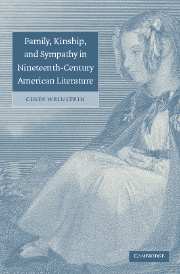Book contents
- Frontmatter
- Contents
- Acknowledgments
- Introduction
- 1 In loco parentis
- 2 “A sort of adopted daughter”: family relations in The Lamplighter
- 3 Thinking through sympathy: Kemble, Hentz, and Stowe
- 4 Behind the scenes of sentimental novels: Ida May and Twelve Years a Slave
- 5 Love American style: The Wide, Wide World
- 6 We are family, or Melville's Pierre
- Afterword
- Notes
- Select bibliography
- Index
- Cambridge Cultural Social Studies
3 - Thinking through sympathy: Kemble, Hentz, and Stowe
Published online by Cambridge University Press: 22 September 2009
- Frontmatter
- Contents
- Acknowledgments
- Introduction
- 1 In loco parentis
- 2 “A sort of adopted daughter”: family relations in The Lamplighter
- 3 Thinking through sympathy: Kemble, Hentz, and Stowe
- 4 Behind the scenes of sentimental novels: Ida May and Twelve Years a Slave
- 5 Love American style: The Wide, Wide World
- 6 We are family, or Melville's Pierre
- Afterword
- Notes
- Select bibliography
- Index
- Cambridge Cultural Social Studies
Summary
When Harriet Beecher Stowe asked her readers to “feel right” at the conclusion of Uncle Tom's Cabin, she most certainly didn't anticipate the many supporters of slavery who, in their reviews of her novel and in their own fictional rebuttals to it, claimed that they did indeed “feel right,” and the benevolent institution of slavery was the result of their sympathies. But this is precisely what did happen, and in the months following the publication of Uncle Tom's Cabin, she prepared A Key to Uncle Tom's Cabin with the intentions of not only defending the authenticity of her novel and denouncing her critics, but reclaiming sympathy for the anti-slavery cause. Tears, the traditional evidence for sympathetic feeling and the primary mode of eliciting sympathy in Stowe's novel, registered one's feeling but not one's politics. In fact, not only did those in favor of slavery insist that their sympathy for slaves surpassed that of northern anti-slavery aggressors, but slaveholders often made the case that they were more deserving candidates for sympathy than their slaves.
In response to pro-slavery appropriations of sympathy, anti-slavery advocates, including Stowe, Lydia Maria Child, Theodore Weld, and others, developed an expanded arsenal of sympathetic expression that would enable readers to see through the meretricious claims of their antagonists and convince them of the truthfulness of the anti-slavery position.
- Type
- Chapter
- Information
- Publisher: Cambridge University PressPrint publication year: 2004

